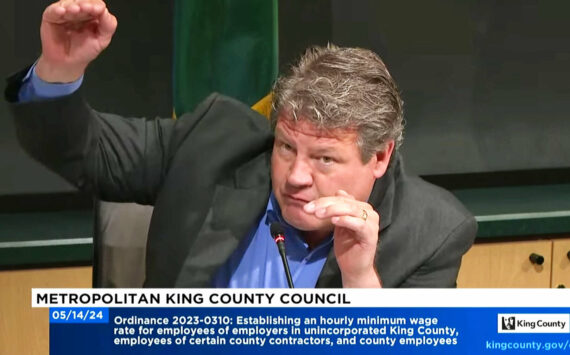Interpreting the Interruption
In our year-in-review issue, Marcus Harrison Green, executive director of the South Seattle Emerald, profiled Marissa Johnson, one of the two women who interrupted a Bernie Sanders rally in Westlake to demand a moment of silence for black victims of police violence. Green argued the interruption was a turning point for the presidential campaign, a moment when candidates realized they wouldn’t be able to stay silent on Black Lives Matter. Some readers agreed, while others remained skeptical of Johnson’s tactics and achievements.
I was pissed at first. Then my son, who is young and hopeful, tells me, “You must remember, these people are fighting for their lives, they are being shot in the streets, everyday.” Duh, me. If this was my kid that I had to worry about just walking outside, I would be interrupting everyone.
Darby1V
,
via seattleweekly.com
[Green wrote]: “Around the same time, Sanders hired a young racial-justice activist as his national press secretary.” Let’s get the facts out there, please. Symone Sanders, a volunteer organizer with the D.C.-based Coalition for Juvenile Justice, had already been tapped by the Sanders campaign, and the announcement came hours after Johnson’s protest at Bernie’s University of Washington rally. She was in Seattle with him to introduce the candidate.
On the topic of Marissa Johnson, this article doesn’t say much about what she is doing for the community other than talking. Is she doing anything other than talking? I listened to what she had to say in an interview she gave on Blackness.TV after the protest. The whole time I was with her, education reform (appalling in Seattle), police accountability, representation, YES YES YES. Up until she said she doesn’t give a f- about what white people think, which is understandable but naive, and then said she doesn’t believe in any form of government. This woman doesn’t understand what we need to be working for if she thinks everything needs to burn down.
I’ll stand with her if she wants to fix what’s broken, but until that time she needs to sit down.
Brett James,
via seattleweekly.com
I am—to my shame—one of those people who said “All Lives Matter” to “Black Lives Matter” when I first heard it. I didn’t get it. Until those brave women disrupted Bernie Sanders in Seattle and I got curious. Just two women. Who made me think. Yeah, it wasn’t comfortable and it wasn’t Seattle “civilized.” But it got my attention.
Sue Whitcomb
,
via Facebook
One Does Not Simply Defend Amazon
Meanwhile, Seth Kolloen penned a comic, illustrated by Tatiana Gill, envisioning what Seattle would be like if Amazon did disappear, as everyone seems to wish it would. Kolloen had the audacity to suggest Seattle would be the worse for it. People were not pleased by this crossing of the party line.
So because we are now so dependent of Shamazon if they disappeared the city would collapse we should bend over and be thankful they are here? What kind of logic is that? Fuck Amazon.
Kelly A,
via seattleweekly.com
Amazon, please build a vast flotilla in the midst of the ocean where your law is rule.
Samuel Fletcher,
via seattleweekly.com
“Mr. Bezos, what did you do with your wealth?”
“I MADE MASS CONSUMERISM AVAILABLE TO EVERY LIVING BEING ON EARTH. IF I MAKE IT TO SPACE I SHALL DO THE SAME.”
Ryan Pat,
via Facebook
What’s that smell?
And lastly, cannabis columnist Michael Stusser noted the annoying stigma that still follows marijuana though it’s perfectly legal here in the Evergreen State. Readers offered their suggestions for how weed can shake the stink.
As far as stigmas go, I think everyone referring to MJ as cannabis now is a good psychological starting point. As well, the more business, sophisticated, educational, and otherwise respectable folks are able to come out of the cannabis closet, the more people will also see how widely accepted it really is. And those who have preconceived notions will learn that many of said stereotypes aren’t always true.
Perry,
via seattleweekly.com
The positive financial aspects of the cannabis industry—medicines, jobs, clothing, building materials and more—should be enough to convince anyone to drop the sigma discussion and open their eyes to the wealth that is yet to be created.
Curtis,
via seattleweekly.com
Comments have been edited for length, clarity, and the “r” word. Spread the word to end the word, folks.
E




